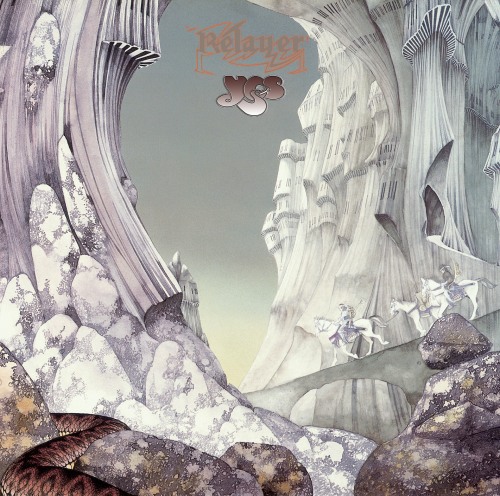Progarchives.com has always (since 2002) relied on banners ads to cover web hosting fees and all.
Please consider supporting us by giving monthly PayPal donations and help keep PA fast-loading and ad-free forever.
/PAlogo_v2.gif) |
|
Post Reply 
|
Page <1 456 |
| Author | |||
HackettFan 
Forum Senior Member 

Joined: June 20 2012 Location: Oklahoma Status: Offline Points: 7946 |
 Posted: September 08 2014 at 14:11 Posted: September 08 2014 at 14:11 |
||
No this won't work at all. The person who designed any of these things is not the grammatical subject of the sentence. We also don't know that they were designed to do what they do, or if it simply a surprise discovery. Certain conclusions are probable, but this is by pragmatic inference (or, maybe in your case with respect to programming, actual background knowledge). Each one of these was a manipulation; a manipulation of matter at the nano level by nanotechnology, a manipulation of ACM messages by MMP, and so on. This is the meaning I intended. (I actually doubt that there are two meanings from a cognitive standpoint, irrespective of dictionary definitions, but that's a theoretical discussion outside the bounds of this thread.) Here is one of my favorites, and there is no designer to read into it: "They will not roll and pitch to the same extent as the Langley, a vessel about one-third their tonnage, but roll and pitch they will when real weather is manipulating the waters of the sea." (The Daily Northwestern, p.7, March 26, 1925.) |
|||
 |
|||
Dean 
Special Collaborator 

Retired Admin and Amateur Layabout Joined: May 13 2007 Location: Europe Status: Offline Points: 37575 |
 Posted: September 09 2014 at 01:58 Posted: September 09 2014 at 01:58 |
||
These are not examples of the definition of "manipulation" that we mean when we talk of manipulation of people's tastes or buying preferences, they are literal and therefore any inference of intentional use of them is semantic not pragmatic, ie it is inferred from their application not by some figurative use.
Irrelevant. And again verb not noun. Words have more than one meaning, those different meanings do not all apply at once, they are context dependant. When we are discussing the figurative manipulation of peoples's tastes and/or buying preferences we are not talking of the literally sense of the word "skillful handling of objects" from the Latin manus, meaning "hand" so meanings of the word that relate to a literal manipulation do not apply. When control or influence is being exerted on people it is always intentional. |
|||
|
What?
|
|||
 |
|||
Toaster Mantis 
Forum Senior Member 

Joined: April 12 2008 Location: Denmark Status: Offline Points: 5898 |
 Posted: September 09 2014 at 14:37 Posted: September 09 2014 at 14:37 |
||
|
Where's Theodor W. Adorno when you really need him?
|
|||
|
"The past is not some static being, it is not a previous present, nor a present that has passed away; the past has its own dynamic being which is constantly renewed and renewing." - Claire Colebrook
|
|||
 |
|||
Dean 
Special Collaborator 

Retired Admin and Amateur Layabout Joined: May 13 2007 Location: Europe Status: Offline Points: 37575 |
 Posted: September 09 2014 at 14:52 Posted: September 09 2014 at 14:52 |
||
Probably still scratching his head in the Bleach Buoys thread.
 |
|||
|
What?
|
|||
 |
|||
Toaster Mantis 
Forum Senior Member 

Joined: April 12 2008 Location: Denmark Status: Offline Points: 5898 |
 Posted: September 10 2014 at 02:51 Posted: September 10 2014 at 02:51 |
||
|
I'm under the impression that 1970s-style rock music (to some extent also covering more progressive stuff) has been going through something of a resurgence in popularity recently, at least here in Scandinavia. What else would you make of a band like Goat?
For that and other reasons, I've become curious as to why some genres of not just music but also film and literature fall in and out of favour with the general public, as well as academics and reviewers. Usually there's some degree of nostalgia in the pop culture for 20 years ago since that's when the generation currently coming of age were born, so right now we should be going through some kind of nostalgia for the 1990s' nostalgia for the 1970s?! The whole thing reminds me of a list on RateYourMusic I linked to a while ago: A compilation of 500 Rolling Stone reviews showing that many records and artists who now are sacred cows were met with indifference or hostility from their reviewers at first. On the other hand, just as many records that got glowing reviews are now seen by the same publication as their artists' lesser work. Also interesting to see which "movements" are either accepted or rejected at various points in their history, like the writers' weird back-and-forth flip-flopping over punk and new wave. I'm kind of confused as to whether there's any kind of consistent mechanisms as to how that happens. Other than the "20 years rule", I'm kind of at a loss. I also picked up a book about the horror genre's history in film and literature last week at the library, and the same phenomenon is at work: Many now-revered authors in the genre were regarded as purveyors of trash in their lifetime (Stoker, Lovecraft etc.), but the material popular back then has just as often been shoved into the kitsch bin by posterity. Maybe I should read the thread again to get through all the armchair sociological discourse, but I've got the impression from a quick skim people's basically arguing in circles. |
|||
|
"The past is not some static being, it is not a previous present, nor a present that has passed away; the past has its own dynamic being which is constantly renewed and renewing." - Claire Colebrook
|
|||
 |
|||
Atavachron 
Special Collaborator 

Honorary Collaborator Joined: September 30 2006 Location: Pearland Status: Online Points: 64353 |
 Posted: September 10 2014 at 03:35 Posted: September 10 2014 at 03:35 |
||
|
^ When you consider a band like AC/DC to this day still captures teenagers' attention and sound exactly the same now as at their peak of popularity, there must be something to a quality of sound that is timelessly appealing and universally satisfying. You can't kill rock 'n roll, indeed.
|
|||
|
"Too often we enjoy the comfort of opinion without the discomfort of thought." -- John F. Kennedy
|
|||
 |
|||
Toaster Mantis 
Forum Senior Member 

Joined: April 12 2008 Location: Denmark Status: Offline Points: 5898 |
 Posted: September 10 2014 at 03:43 Posted: September 10 2014 at 03:43 |
||
|
Yeah, but consider the many rock groups from the same generation as AC/DC who aren't as popular with younger generations as they are. That's where the entire common "dad rock" epithet comes from.
|
|||
|
"The past is not some static being, it is not a previous present, nor a present that has passed away; the past has its own dynamic being which is constantly renewed and renewing." - Claire Colebrook
|
|||
 |
|||
Atavachron 
Special Collaborator 

Honorary Collaborator Joined: September 30 2006 Location: Pearland Status: Online Points: 64353 |
 Posted: September 10 2014 at 04:19 Posted: September 10 2014 at 04:19 |
||
|
^ That's my point, true classics are always in favor (e.g. The Beatles).
|
|||
|
"Too often we enjoy the comfort of opinion without the discomfort of thought." -- John F. Kennedy
|
|||
 |
|||
Prog_Traveller 
Forum Senior Member 

Joined: May 29 2005 Location: Bucks county PA Status: Offline Points: 1474 |
 Posted: September 10 2014 at 16:54 Posted: September 10 2014 at 16:54 |
||
Yeah you don't see many kids walking around with UFO or Thin Lizzy t shirts.  I have often thought about this myself. Somehow Led Zeppelin, Pink Floyd and even RUSH became cool with the younger generation when it seems that The WHO and YES haven't. I'm not sure what causes the younger folks to decide band A is cool and band B isn't but fortunately we don't have much of that on this site. As long as there is at least one band that leads to a fascination with prog then I guess that's all that really matters. Still I wish more younger folks were getting into YES and GENESIS not to mention Camel, ELP, Gentle Giant, VDGG, Spock's Beard, Flower Kings etc. Edited by Prog_Traveller - September 10 2014 at 16:56 |
|||
 |
|||
Dean 
Special Collaborator 

Retired Admin and Amateur Layabout Joined: May 13 2007 Location: Europe Status: Offline Points: 37575 |
 Posted: September 10 2014 at 17:23 Posted: September 10 2014 at 17:23 |
||
It's just retro-fashion - the t-shirt was probably bought before the album. (that's Kate Moss btw)
Edited by Dean - September 10 2014 at 17:24 |
|||
|
What?
|
|||
 |
|||
rogerthat 
Prog Reviewer 
Joined: September 03 2006 Location: . Status: Offline Points: 9869 |
 Posted: September 10 2014 at 21:22 Posted: September 10 2014 at 21:22 |
||
I think marketing is involved in it. Some bands are pushed more on the audience than others because perhaps the labels have decided they have more sales potential. I don't believe in the No True Scotsman fallacy. I remember when it once rained here in November (completely unseasonal) the newspaper immediately ran a small article on November Rain. Eh, is it really necessary to so desperately promote GNR? Some such bands are cherrypicked for promotion. It need not have much to do with their popularity at that time either. For eg, Van Halen have produced two of the biggest selling rock albums of the 70s and 80s and yet they have not been marketed the way GNR were because their transparent misogyny makes them 'uncool' and they lack boring, uber power ballads that MTV loves and GNR has in plenty. Edited by rogerthat - September 10 2014 at 23:44 |
|||
 |
|||
King Crimson776 
Forum Senior Member 

Joined: October 12 2007 Location: United States Status: Offline Points: 2762 |
 Posted: September 11 2014 at 01:46 Posted: September 11 2014 at 01:46 |
||
|
I've scarcely seen a dumber phrase than "the new folk", especially in the context that this article uses it.
Anyway, if prog will be the next fad, you'll just have sh*t like Muse and The Mars Volta. I don't give a sh*t about that. Wake me up when people actually like music.
|
|||
 |
|||
Toaster Mantis 
Forum Senior Member 

Joined: April 12 2008 Location: Denmark Status: Offline Points: 5898 |
 Posted: September 11 2014 at 03:10 Posted: September 11 2014 at 03:10 |
||
Well, that's as much a matter of changing cultural norms as marketing or even inherent qualities of the music resulting in it being judged on different criteria. The case of certain hard rock groups being nowhere as popular as in the 1970s/1980s, because society now is more sensitive towards gender issues and less accepting of overtly misogynistic lyrics, is just one. A less politically loaded one I suspect is that often the aesthetic - not just lyrics and visual presentation but also things like production technology - of music can get very strongly associated with a particular cultural milieu unique to a specific time and place. I mean, I like Yes but in their example their lyrics and cover art give off a major "explosion in a New Age bookstore" vibe. The synthesizers and elfin vocals furthermore date their entire aesthetic as very "first half of the 1970s" in a way that even strikes me as somewhat kitschy. To use Prog_Traveller's examples, Led Zeppelin and Pink Floyd's aesthetics don't scream "1970s" anywhere as loudly. Funny how things that were originally meant to be avant-garde and small-p progressive might 40 years later come across as old-fashioned for the same reasons now and then. |
|||
|
"The past is not some static being, it is not a previous present, nor a present that has passed away; the past has its own dynamic being which is constantly renewed and renewing." - Claire Colebrook
|
|||
 |
|||
Gerinski 
Prog Reviewer 

Joined: February 10 2010 Location: Barcelona Spain Status: Offline Points: 5093 |
 Posted: September 11 2014 at 04:27 Posted: September 11 2014 at 04:27 |
||
|
The Darkness in the early 2000's were an attempt to bring back the early 70's hard rock & glam style and aesthetics with a dose of humor but despite some moderate success it did not really pick up and no other bands jumped in.
|
|||
 |
|||
rogerthat 
Prog Reviewer 
Joined: September 03 2006 Location: . Status: Offline Points: 9869 |
 Posted: September 11 2014 at 10:03 Posted: September 11 2014 at 10:03 |
||
I would agree, except that I do find LZ very 70s, a lot more so than The Who, for instance. I would not underestimate the power of marketing to persuade people to give the music a chance. If you are told repeatedly that a certain band is great and one of the legends of rock, you might just listen to it. And chances are you do like it. I have no quarrel with such reinforcement in the case of LZ but find it a lot more unquestionable in the case of ACDC or GNR.
|
|||
 |
|||
Toaster Mantis 
Forum Senior Member 

Joined: April 12 2008 Location: Denmark Status: Offline Points: 5898 |
 Posted: September 11 2014 at 13:29 Posted: September 11 2014 at 13:29 |
||
|
Well, I rather find The Who to be very 1960s instead so that's not so strange. I also do consider Led Zeppelin's classic records to have aged much worse than what Black Sabbath or even Deep Purple were playing at the same time.
|
|||
|
"The past is not some static being, it is not a previous present, nor a present that has passed away; the past has its own dynamic being which is constantly renewed and renewing." - Claire Colebrook
|
|||
 |
|||
Post Reply 
|
Page <1 456 |
| Forum Jump | Forum Permissions  You cannot post new topics in this forum You cannot reply to topics in this forum You cannot delete your posts in this forum You cannot edit your posts in this forum You cannot create polls in this forum You cannot vote in polls in this forum |